Music & Media Scene
Music - Movies & TV - Documentaries - Books - Radio Themes
Click any thumbnail for a larger image.
The Music Scene
It goes without saying that the progressive rock music scene was certainly important to FM radio. The music made FM radio distinctive and FM radio promoted the groups so that they became commercially viable. On these pages, we'll attempt to highlight some of the important aspects of the music of the 1960s and 1970s.
Fillmore East Schedule Postcards
March 8, 1968 to June 27, 1971
Bill Graham's Fillmore East was the New York cathedral of rock & roll. Located on 2nd avenue in the East Village, the venue was formerly a Yiddish theatre and later, the Loew's Commodore movie theater before becoming the Village Theater where some rock concerts were held before officially becoming the 2800 seat Fillmore East. It was the place to hear every important group of the progressive rock era. While frequently criticized at the time by those who thought that "music should be free" (nothing changes), he actually provided incredible value: tickets initally at $3, $4 and $5 and later at $3.50, $4.50 and $5.50 ($23 to $36 in 2015 dollars), one could see up to three great acts and a light show. It was only open a bit over three years, but it was incredibly important and influential.
Here are some of the listings detailing the incredible nights of music:
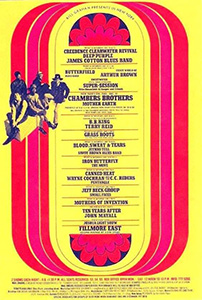
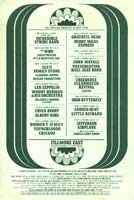
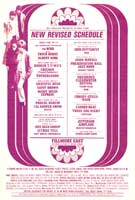
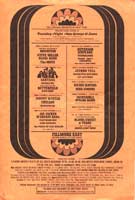
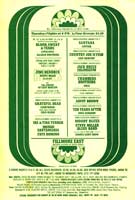
Dec 1968 to March 1970
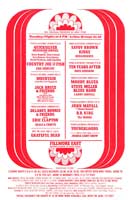
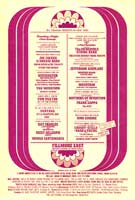
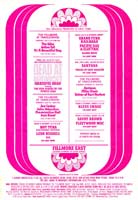
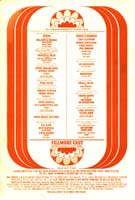
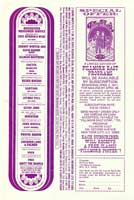

January 1970 to June 1971
Central Park Music Festival Program
July, 1969
The Central Park Music Festival was held every summer between 1968 and 1976 (although on a greatly reduced schedule from 1975) at the Wollman Memorial Skating Rink. Tickets were incredibly inexpensive, even for the time: "orchestra" tickets were $1.00 and "upstairs" seats were 75 cents (the equivalent of $6.74/$5.06 in 2015). I remember seeing Richie Havens, the Butterfield Blues Band, Jefferson Airplane, possibly Jimi Hendrix, and many other great acts there, frequently on the same bill. However, my memory is completely incorrect as Havens, the Airplane and Hendrix never played there. But looking at the schedule I believe I did see an incredible array of acts. You can view the schedule here: Schaefer Music Festival on Wiki (off site)
Each year, subway posters would announce the acts for the entire summer and one would run to the ticket booth to buy tickets for the entire season. And if you didn't have a ticket, you could sit up on the rocks above the rink.
The festival was originally produced by Hilly Kristal (CBGBs) and Ron Delsener, and a program was produced. Part of the program was dedicated to bios of each of the DJs who hosted the shows. (I believe these pages were from the 1969, 1970 or 1971 program.) At one of the shows (I don't remember the act, but it was probably the Butterfield Blues Band), I was sitting in the first row of the "bleacher" section, way in the back, but John Zacherley came out to sit with us, which gave us a great thrill at the time.
Note the comment about Hal Jackson working on three different New York stations at the same time. Wow!
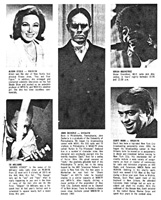
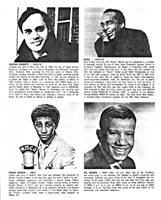
The Woodstock Festival flyer
circa Summer 1969
One of the original flyers for the Woodstock festival.
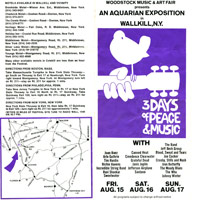
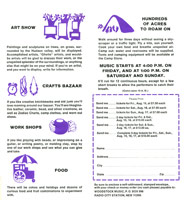
Capitol Theatre Schedule
February 1970
The Capitol tried to do for suburbia what the Fillmore East did for the city. Here's a sample schedule for February and March of 1970. The Capitol has recently been renovated and restored to its original 1920's glory and is once again hosting music shows regularly.
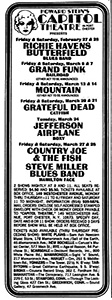
Back to Top
Movies & TV Shows About Radio
While much media today is self-referential (a frequent critique about today's movies), there actually aren't that many movies about radio. There are a few in which radio is a major part of the plot and others in which it's only secondary to the plot, but it's still fun to see how radio is represented in the movies.
Here's a list of the movies and TV series about radio that we remember -- feel free to post your favorites on the Greetings Board if you remember others.
Disc Jockey (1951)
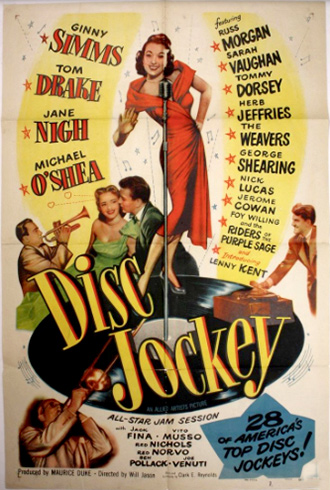
Directed by Will Jason. Written by Clarke Reynolds
Ginny Simms, Jane Nigh, Tom Drake, Lenny Kent, Michael O'Shea and Jerome Cowan.
with performers Tommy Dorsey, George Shearing, Sarah Vaughan, Herb Jeffries, Nick Lucas, The Weavers, Jack Fina, Vido Musso, Red Nichols, Red Norvo, Ben Pollack, Joe Venuti, Foy Willing, and Riders of the Purple Sage playing themselves.
DJ's include: Martin Block, Joe Adams, Joe Allison, Bill Anson, Doug Arthur, Don Bell, Paul Brenner, Bob Clayton, Paul Dixon, Ed Gallagher, Dick Gilbert, Bill Gordon, Maurice Hart, Bruce Hayes, Eddie Hubbard, Bea Kalmus, Lea Malloy, Paul Masterson, Ed McKenzie, Tom Mercein, Gill Newsome, Gene Norman, Art Pallans, Bob Poole, Norm Prescott, Fred Robbins, Ernie Simon, and Larry Wilson
A musical review
Rock Around The Clock (1956)
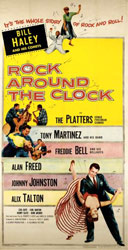
Directed by Fred F. Sears. Story by James B. Gordon and Robert E. Kent.
Alan Freed, Bill Haley & the Comets, Tony Williams & the Platters, Tony Martinez, Freddie Bell, Johnny Johnston, Alix Talton, Lisa Gaye, John Archer, Henry Slate, Earl Barton.
A fictionalized story about the discovery of rock 'n' roll. Johnny Johnston (not be confused with Johnny Johnson, who discovered Chuck Berry), who was a leading man in movie musicals of the 1940s, such as Mardi Gras and Showboat Serenade plays Steve Hollis who visits a small town and "discovers" Bill Haley and the Comets. Songwriter Ernie Maresca ("Runaround Sue", "Shout, Shout, Knock Yourself Out") plays himself.
Don't Knock The Rock (1956)
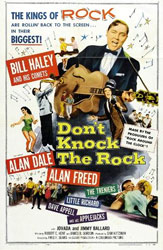
Directed by Fred F. Sears. Story and Screenplay by Robert E. Kent .
Alan Freed, Alan Dale, Patricia Hardy, Fay Baker, Jana Lund, Pierre Watkin with Bill Haley & the Comets, Dave Appell, the Applejacks, The Treniers and Little Richard.
Alan Dale plays Arnie Haynes, a performer who returns home to adoring fans but must confront adults who think Rock 'n' Roll will turn their kids into juvenile delinquents. Alan Freed and Bill Haley help him out.
I was only six years old when this came out, but I remember seeing it. Maybe there was a revival a few years later.
The Girl Can't Help It (1956)

Directed by Frank Tashlin. Screenplay by Frank Tashlin and Herbert Baker from a novel by Garson Kanin.
Tom Ewell, Jayne Mansfield, Edmond O'Brien, Barry Gordon, Henry Jones, John Emery.
with musical performances by Julie London, Fats Domino, The Platters, Little Richard and his Band, Gene Vincent and his Blue Flames, The Treniers, Eddie Fontaine, The Chuckles, Abbey Lincoln and Johnny Olenn.
Not a DJ film per se, but included becasue of the rock artists included and the impact the film had on rock 'n roll fans. The plot, about a down-and-out mobster who hires an alcoholic press agent to make his blonde bombshell girlfriend a recording star is trivial, but the performances are great. This film reportedly heavily influenced John Lennon, who saw the film in the summer of 1957 and Paul McCartney.
Rock Rock Rock! (1956)
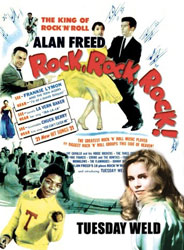
Directed by Will Price. Screenplay by Milton Subotsky from a story by Subotsky and Phyllis Coe.
Alan Freed, Fran Manfred, Tuesday Weld, Teddy Randazzo, Jacqueline Kerr, Ivy Schulman.
with musical performances by The Moonglows, Chuck Berry, The Flamingos, Jimmy Cavallo and the House Rockers, The Johnny Burnette Trio, La Vern Baker, Cirino and the Bowties, Frankie Lymon and the Teenagers and The Coney Island Kids.
IMDB says the plot is "a young teenage girl desperately tries to earn enough money to buy a dress for a school dance." Well, at least she doesn't have vampire problems. IMDB also claims that Yvette Mimieux (The Time Machine) was in the film, that Connie Francis did some unredited singing and that Valerie Harper (Rhoda) appeared in the film. The incredibly beautiful Tuesday Weld would go on to a regular role in The Many Loves of Dobie Gillis TV series.
Mister Rock and Roll (1957)
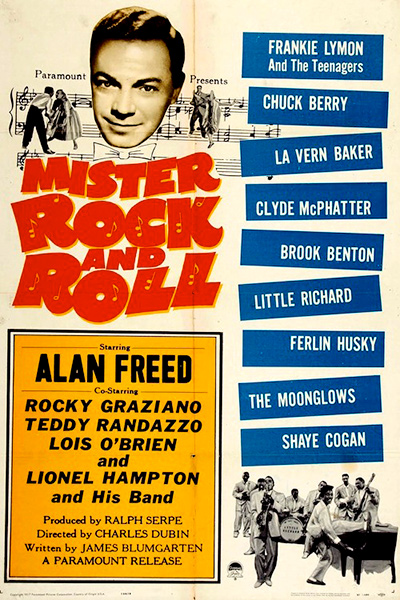
Directed by Charles S. Dubin. Written by James Blumgarten
Alan Freed, Teddy Randazzo, Lois O'Brien, Rocky Graziano, Jay Barney, Al Fisher, Lou Marks, Leo Wirtz, Ralph Stanley
with performances by Lionel Hampton and his Band, Ferlin Husky, Frankie Lymon and the Teenagers, Little Richard, Brook Benton, Chuck Berry, Clyde McPhatter, La Vern Baker, Shaye Cogan, Screamin' Jay Hawkins
What a cast! Freed supposedly "tells" the story of Rock 'n' Roll. Randazzo wrote lots of hits for Little Anthony including "Goin' Out of My Head" and "Hurt So Bad". Director Dubin would go on to direct many TV episodes of Mash, Hawaii Five-O, Kojak and Roots: The Next Generation.
Go, Johnny, Go! (1959)
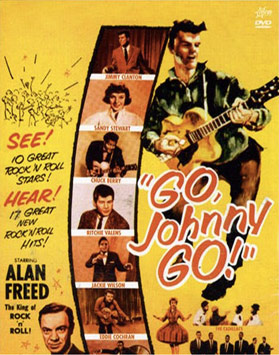
Directed by Paul Landres. Written by Gary Alexander
Alan Freed, Jimmy Clanton, Sandy Stewart, Herb Vigran, Frank Wilcox, Barbara Woodell, Milton Frome, William Fawcett
with performances by Chuck Berry, Jackie Wilson, Ritchie Valens, The Cadillacs, Jo Ann Campbell, Harvey Fuqua and the Flamingos, Eddie Cochran, Jimmy Cavallo and the House Rockers
Freed plays a promoter who holds a talent search contest and must find the winner, Jimmy Clanton, who doesn't know he's won. This was the last of the Freed rock movies. Fawcett, who had a Ph.D., became a TV actor, mainly in westerns like Maverick, Wagon Train, Laramie, Bonanza, etc.
I saw this one a few years ago -- it's cheaply made but the print is in amazing shape, so it really looks great.
You Are What You Eat (1968)
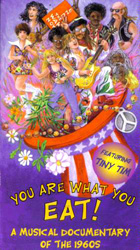
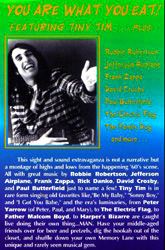
Directed by Barry Feinstein
Featured in the film are (or the music of): Paul Butterfield, David Crosby, Dave Dixon, John Herald, Sharmagne Leland-St. John, Barry McGuire, Rosko, John Simon, Tiny Tim, Peter Yarrow, Frank Zappa, The Electric Flag, Harper's Bizarre
A stream-of-consciousness documentary of sorts. We've included it only because WNEW-FM's Rosko (Bill Mercer) is in it, though we're not sure if you actually see him or whether you only hear his voice.
Phil Ramone was an associate producer of this movie. Feinstein was also a cinematographer on Monterey Pop, released in the same year. He was married to Carol Wayne, the blonde who often appeared on The Johnny Carson Show. I thought she was in this movie, but she's not listed in any of the online credits and the film is not listed in her credits. But I bet she is actually in the film.
WUSA (1970)
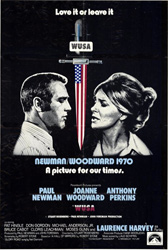
Directed by Stuart Rosenberg. Novel and Screenplay by Robert Stone.
Paul Newman, Joanne Woodward, Anthony Perkins, Laurence Harvey, Pat Hingle, Bruce Cabot, Cloris Leachman, Moses Gunn, Wayne Rogers, Feoff Edwards.
Newman plays a drifter who gets a job as an announcer for right-wing radio station WUSA, New Orleans. Woodward plays a "whore with a heart of gold" who tries to get him to change his detached stance. The station eventually becomes embroiled in a right-wing conspiracy to discredit welfare.
Got terrible reviews when it was released, but has a great cast. Anthony Perkins was of course, made famous by Psycho, Bruce Cabot was in the original King Kong and Wayne Rogers would go on to co-star in the TV version of M*A*S*H.
Play Misty For Me (1971)
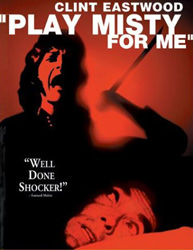
Directed by Clint Eastwood. Story by Jo Heims. Screenplay by Jo Heims and Dean Riesner
Clint Eastwood, Jessica Walter, Donna Mills, Don Siegel
Also appearing: Cannonball Adderly and Johnny Otis
Jessica Walter stalks DJ Clint Eastwood. This was Eastwood's second directing effort. Don Seigel, who directed Dirty Harry, appears in the film.
Vanishing Point (1971)
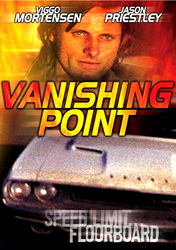
Directed by Richard C. Sarafian. Screenplay by Guillermo Cain
Barry Newman, Cleavon Little, Dean Jagger, Charlotte Rampling.
Features Bonnie & Delaney Bramlett as themselves with an uncredited Rita Coolidge.
Just another car chase movie except that Newman is guided through the chase by blind radio DJ Cleavon Little. Not a great movie, but worth seeing for the cast and for Delaney & Bonnie.
The King of Marvin Gardens (1972)
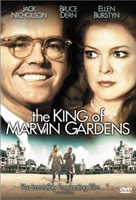
Directed by Bob Rafelson. Screenplay by Jacob Brackman. Story by Bob Rafelson and Jacob Brackman.
Jack Nicholson, Bruce Dern, Ellen Burstyn
Bruce Dern, the King of Marvin Gardens, lives on the Boardwalk and fronts for the Atlantic City local mob. A dreamer, he asks his brother, a radio talk show host played by Nicholson, to help him build his dream paradise on a Pacific Island.
American Graffiti (1973)
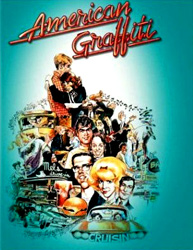
Directed by George Lucas. Written by George Lucas, Gloria Katz & Willard Huyck
Richard Dreyfus, Ron Howard, Paul LeMat, Cindy Williams, Charles Martin Smith, Candy Clark,
Mackenzie Phillips, Wolfman Jack, Bo Hopkins, Harrison Ford
A day in the life of teens in a pre-Beatles (1962) small California town accompanied by an early-60s soundtrack largely hosted by "the mysterious" Wolfman Jack, who is seen at his radio station towards the end of the film.
The film features an early pre-Star Wars Harrison Ford as well as short appearances by Suzanne Somers (as the "blonde in the car") and Johnny Weissmuller, Jr. The film made stars out of many of the performers, several of whom went on to long-running TV show gigs, except for Harrison Ford, who returned to carpentry or something.
The film was a surprise hit, budgeted at under $800,000 and earning almost $150 million ($737 million in 2010 dollars!)
The Night That Panicked America (1975)
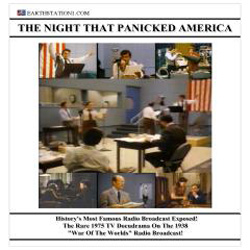
Directed by Joseph Sargent. Play ("Invasion From Mars") by Howard Koch. Story and screenplay by Nicholas Meyer. Teleplay by Anthony Wilson
Vic Morrow, Cliff De Young, Michael Constantine, Walter McGinn, Eileen Brennan, Meredith Baxter,
Tom Bosley, Will Geer, Paul Shenar, John Ritter, Casey Kasem, Ron Rifkin
An incredibly well done TV movie about Orson Welles and the "War of the Worlds" broadcast of 1939. In spite of an announcement several times during the broadcast that this was only a dramatic show, many who heard the broadcast thought it was real and some supposedly came close to taking their lives in panic. In retrospect, the show mirrored our fears about the war in Europe, which had just begun.
Once the broadcast starts, whether the film follows the action in the radio studio or the action in the streets, we hear the entire re-created broadcast. Paul Shenar was totally believable as Welles and many of the original Mercury Players appeared in the film, such as Will Geer (The Waltons). American Top 40 DJ Casey Kasem also plays one of the Mercury Players.
One highlight of the film is when it demonstrates how sound effects were produced during live radio broadcasts.
The film was a real treat and it should be re-broadcast on every Halloween, but for some reason, I don't think it's been shown since the original broadcast. It was nominated for an Emmy for Film Editing and Writing and won the Emmy for Film Sound Editing for a Special Program.
American Hot Wax (1978)
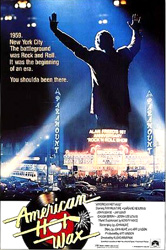
Directed by Floyd Murtax. Written by John Kaye & Art Linson
Tim McIntire, Fran Drescher, Jay Leno, Laraine Newman
with musical peformers Chuck Berry, Jerry Lee Lewis, Screamin' Jay Hawkins and Kenny Vance
with appearances by Melanie Chartoff, Richard Perry and Cameron Crowe.
An under-appreciated film bio about Alan Freed with McIntire in the lead.
Like most film bios, it played loose with the facts, but it still was emotionally accurate in terms of what rock meant to young people. McIntire was much younger looking than Freed and no attempt was made to make Berry, Lewis or Hawkins look like their 1950s selves, but their music performances are classic. Hawkins' performance of I Put A Spell On You is just as demeneted as the original studio recording, which Hawkins recorded in one take (and as legend has it, was totally drunk). Newman plays a young girl who produces a black vocal group and is an approximation of a Carole King archetype.
Newman was a member of the original Saturday Night Live cast and Chartoff was a cast member of Fridays, an ABC show that was actually a lot more creative than SNL. Richard Perry is the famous record producer of Rod Stewart, Carly Simon and Ringo Starr. Cameron Crowe, who has a cameo as a delivery boy, is the Rolling Stone writer whose story was featured in Almost Famous.
FM (1978)
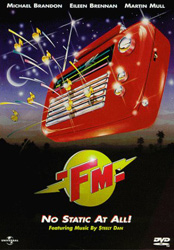
Directed by John A. Alonzo. Written by Ezra Sachs.
Michael Brandon, Eileen Brennan, Alex Karras, Cleavon Little, Martin Mull, Cassie Yates, Norman Lloyd with Linda Ronstadt, Jimmy Buffet, REO Speedwagon and Tom Petty. Music by Steely Dan.
Hollywood's version of a hippie FM station and the battle between the staff and management. Brennan was terrific as "Mother", an older burnt-out female DJ. Cleavon Little had replaced Richard Pryor in Mel Brooks' Blazing Saddles a few years earlier. Four years later, Norman Lloyd went on to a long-term role on TV's St. Elsewhere hospital drama. As of 2016, he's still alive (at 101!) and was most recently in the Amy Schumer film, Trainwreck and is the oldest working Hollywood actor.
WKRP In Cincinnati (TV 1978-1982)
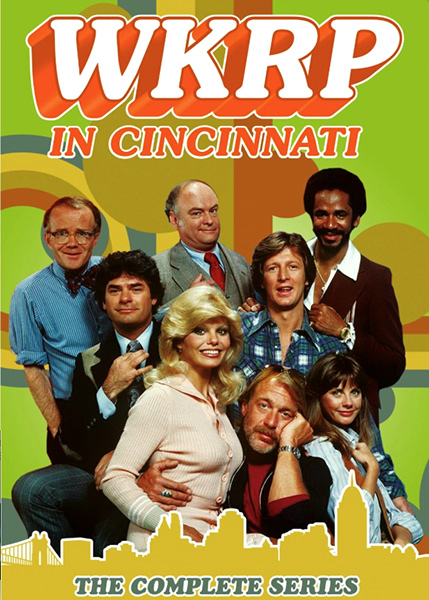
Directed by Rod Daniel, Will Mackenzie, Asaad Kelada, Linda Day and others.
Written by Hugh Wilson, Steve Marshall, Dan Guntzelman, Blake Hunter, Pete Torokvei, Steven Kampmann, Lissa Levin and others.
Gary Sandy, Gordon Jump, Howard Hesseman, Loni Anderson, Richard Sanders, Frank Bonner, Tim Reid and Jan Smithers.
Originally vilified by TV critics as "crap in Cincinnati", the show became a classic by its seventh episode when the station attempts a promotion to drop turkeys from a helicopter, which results in something akin to the Hindenberg disaster.
While some of the characters were cartoonish, Hesseman nailed his role as a weary DJ, although his persona better fit the image of an FM, not AM, rock radio jock. Anderson was wonderful as the all-knowing very hot and overpaid secretary, Sanders was great as a ditsy news guy but Smithers was underused as the sweet girl-next-door type.
Be aware that the original DVD version of this show contains almost no original music because of licensing issues with the tracks. The 2014 remastered edition contains about 80% of the original music.
The Warriors (1979)
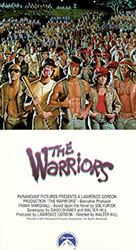
Directed by Walter Hill. Novel by Sol Yurick. Screenplay by David Shaber and Walter Hill.
Michael Beck, James Remar, Dorsey Wright, Brian Tyler, David Harris, Lynne Thigpen
The Warriors, a Coney Island gang falsely accused of killing another gang's leader must make a perilous trip from The Bronx to Coney Island while being pursued by all the other gangs and the police. Lynne Thigpen plays a radio DJ who narrates the action.
The movie was supposed to represent a dystopian future of New York City and it certainly seemed like it might be the case when the movie was made. But now that the subway hardly contains graffiti anymore, crime is at the lowest rate in 40 years and it costs something like $35 to spend several hours in Coney Island's new Luna Park, which replaced Astroland, we can see that they got it completely wrong. But it's a fun film nonetheless.
This movie has become a cult favorite. Hill would go on to direct "The Long Riders" and "48 Hrs." and he was a producer on "Alien", "Aliens" and the recent "Prometheus".
The Idolmaker (1980)
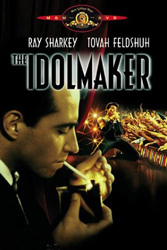
Directed by Taylor Hackford. Written by Edward Di Lorenzo
Ray Sharkey, Tovah Feldshuh, Peter Gallgher, Joe Pantoliano, Maureen McCormick, Olympia Dukakis
Based on the life of rock producer/promoter Bob Marucci, who discovered Frankie Avalon and Fabian. But how could they make a movie about Avalon and Fabian and not have someone playing Dick Clark in the movie?
Good Morning Vietnam (1987)
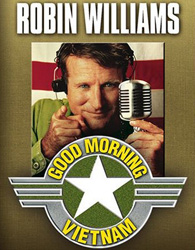
Directed by Barry Levinson. Written by Mitch Markowitz
Robin Williams, Forest Whitaker, Bruno Kirby, Robert Wuhl, J.T. Walsh, Floyd Vivino and Danny Aiello
Robin Williams as armed forces DJ Adrian Cronauer, who shakes things up while on tour in Vietnam. The usual humanist wild guy vs. the stiff brass comedy. The great Uncle Floyd (Vivino) had a small role. Williams was nominated for a Best Actor Oscar.
The story was highly fictionalized as the actual Cronauer was a lifelong political conservative and had never been in conflict with his superiors. Cronauer later said that if he had done half the things Williams' character did in the film, he would have spent the rest of his life in military jail. But that wouldn't have made for a very good movie where there has to be conflict, and very obvious good guys and bad guys.
I like to imagine other people in the lead role: perhaps Bill Murray or Steve Buscemi.
Radio Days (1987)
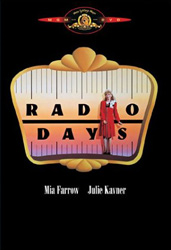
Directed and Written by Woody Allen
Don Pardo, Julie Kavner, Wallace Shawn, Seth Green, Josh Mostel, Michael Tucker, Dianne Wiest, Kenneth Mars, Mia Farrow, Tito Puente, Larry David, Danny Aiello, Jeff Daniels, Kitty Carlisle,
Mercedes Ruehl, Tony Roberts, Diane Keaton, William H. Macy
and the voices of Jackson Beck, Gregg Almquist, Wendell Craig, Ken Roberts, Norman Rose and Kenneth Welsh.
Woody Allen's masterpiece alternates between middle-class life in 1940's Rockaway Beach, NY, in which the radio accompanies almost all daily activities, and the upscale lives of the radio performers. The film rings emotionally true and includes the voices of many 1940s radio announcers who were still living when the film was made. Allen must have been going through some good times when he made this film as it's probably his most positive, uplifting film.
I had the honor of working with several of the voice-over actors who appear in the film, including Jackson Beck, who recorded the original "Dial-A-Santa" campaign for the New York Telephone Company and Norman Rose, who had such a deep voice, he always claimed he gave himself a headache.
The film was nominated for two Oscars for best screenwriting and best set decoration.
Talk Radio (1988)
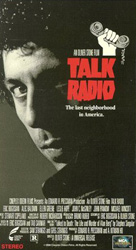
Directed by Oliver Stone. Book by Stephen Singular. Based on the play by Eric Bogosian and Tad Savinar. Screenplay by Eric Bogosian and Oliver Stone.
Eric Bogosian, Ellen Greene, Leslie Hope, John C. McGinley, Alec Baldwin, John Pankow
A brilliant but somewhat claustrophobic film based on Bogosian's play (which itself was based on the book "Talked to Death: The Life and Murder of Alan Berg") in which the audience is asked to sympathize with a self-destructive and cruel liberal talk-show host whose local talk show is about to be syndicated nationally. Bogosian's character can't seem to make up his mind whether he wants the money and power syndication will bring or whether he feels that he's selling out. (It almost sounds quaint - today everybody takes the money - if Berg had not been murdered, he'd probably be working for WABC radio or for FOX as a Conservative talk show host.)
Bogosian's character proves that "liberal" talk doesn't have to be boring, although I'm sure had the character survived, he'd now be taking Democrats to task as much as Conservatives - he was an equal opportunity offender who wasn't afraid to manipulate the truth for dramatic effect.
The real Alan Berg had passed the Illinois state bar exam at age 22, but experienced seizures and became an alcoholic. He eventually recovered and opened a clothing store in Denver. He appeared several times on Laurence Gross' show on KGMC. When Gross left to take a job in San Diego, Berg took over. He also did stints at KHOW, KWBZ and eventually KOA, where he worked until his death. Two members of a neo-Nazi group called The Order were sentenced to life terms on racketeering and conspiracy charges and for violating Berg's civil rights (but inexplicably not for murder). Berg's murder may have been inspired by The Turner Diaries.
Midnight Caller (TV 1988-1991)
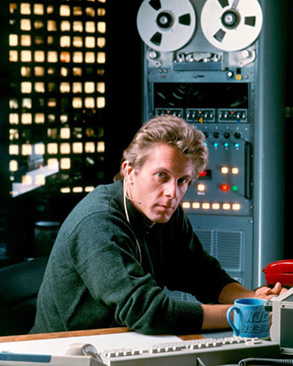
Created by Richard Di Leilo
Gary Cole, Dennis Dun, Arthur Taxier
Cole plays an ex-cop who accidentally killed his partner and has become a talk show host - one who gets personally involved with the problems of those who call his show.
Bad Channels (1992)
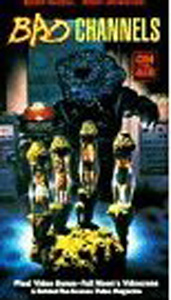
Directed by Ted Nicolaou. Story by Charles Band. Screenplay by Jackson Barr.
Robert Factor, Martha Quinn, Aaron Lustig
An alien takes over a radio station in order to capture human females and shrink them for his collection. Right. Factor and Lustig have done a lot of bit TV work. Quinn was the MTV video jockey.
Straight Talk (1992)
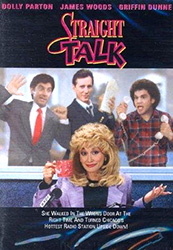
Directed by Barnet Kellman. Story by Carig Bolotin. Screenplay by raig Bolotin and Patricia Resnick.
Dolly Parton, James Woods, Griffin Dunne, Michael Madsen, John Sayles, Teri Hatcher, Spalding Gray, Jerry Orbach, Philip Bosco, Charles Fleischer, Jay Thomas
Dolly Parton moves to Chicago and becomes a radio talk show host. Not a great movie, but a great cast. At least Spalding Gray and Jay Thomas had actually worked in radio. Kellman was a TV director who had directed soap operas and episodes of Designing Women and Mad About You before making this movie and would go on to direct episodes of Murphy Brown and an episode of Alias.
Frasier (TV 1993-2004)
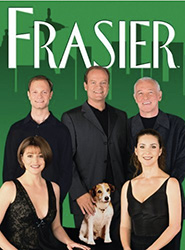
Created by David Angell, Peter Casey & David Lee
Kelsey Grammer, Jane Leeves, David Hyde Pierce, Peri Gilpin, John Mahoney.
Grammer plays a psychiatrist who never seems to practice psychiatry, but hosts a radio talk show. Great writing, but the character is never very convincing as a radio talk show host, although that wasn't the point of the show. Gilpin plays his producer. Gilpin's father was WOR-FM Drake-era DJ Jim O'Brien.
Sleepless in Seattle (1993)
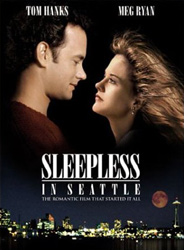
Directed by Nora Ephron. Story by Jeff Arch. Written by Nora Ephron, David S. Ward and Jeff Arch.
Tom Hanks, Ross Malinger, Rita Wilson, Victor Garber, Meg Ryan, Bill Pullman,
David Hyde Pierce, Calvin Trillin, Rosie O'Donnell, Rob Reiner
Romantic nonsense when a widowed man's kid calls a radio talk show in order to find his father a partner. But Meg Ryan is incredibly cute, if a bit too unbelieveably needy.
Can you imagine this happening today? Who would the kid call - Howard Stern? Rush? Sean Hannity? Now that might make for a funny movie. Rush could set the father up with Michelle Malkin or Ann Coulter. Hilarity ensues when they find out Tom Hanks' character is a liberal. The kid cries when the romantic interest accuses Hanks' character of being a socialist. Howard Stern just wants to know Ann Coulter's bust size.
Nominated for 2 Oscars for Writing and Music.
Airheads (1994)
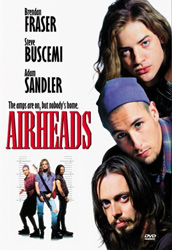
Directed by Michael Lehmann. Written by Rich Wilkes
Brendan Fraser, Steve Buscemi, Adam Sandler, Chris Farley, Michael McKean, Judd Nelson,
Ernie Hudson, Amy Locane, Nina Siemaszko, Marshall Bell, Reg E. Cathey, David Arquette, Michael Richards, Joe Mantegna
A rock band kidnaps a radio station in order to get their music played. Another silly movie with a great cast. Richards was halfway through his Seinfeld run when this film was made. McKean had made Spinal Tap and Hudson had appeared in Ghostbusters ten years earlier.
Radioland Murders (1994)
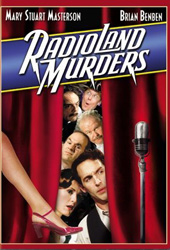
Directed by Mel Smith. Story by George Lucas. Written by Willard Huyck & Gloria Katz and Jeff Reno & Ron Osborn.
Brian Benben, Mary Stuart Masterson, Ned Beatty, George Burns, Michael Lerner, Michael McKean, Jeffrey Tambor, Christoper Lloyd, Larry Miller, Anita Morris, Corbin Bernsen, Rosemary Clooney,
Bobcat Goldthwait, Candy Clark, Bo Hopkins, Robert Klein, Harvey Korman and Peter MacNicol.
Haven't seen this one, because I seem to remember it getting terrible reviews. Roger Ebert wrote, "...the movie just doesn't work. It's all action and no character, all situation and no comedy." What do you expect from the people responsible for "Howard the Duck"?
It almost sounds like a Woody Allen story: in 1939, a fourth radio network premieres with a broadcast interrupted by a mysterious voice. Members of the cast soon show up dead.
Great cast, including Michael McKean (Spinal Tap), Jeffrey Tambor (Larry Sanders Show), Christopher Lloyd (Back to the Future, Taxi), Peter MacNicol (Ghostbusters II, Ally McBeal), stand-up comic Robert Klein and others. This was George Burns' last movie -- he was about 97 when the film was made.
Bye Bye Love (1995)
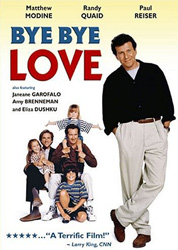
Directed by Sam Weisman. Written by Gary David Goldberg and Brad Hall.
Matthew Modine, Randy Quaid, Paul Reiser, Janeane Garofalo, Amy Brennerman,
Eliza Dushku, Ed Flanders, Rob Reiner
A film about a bunch of friends who are either divorced, getting divorced or unable to commit. There's a subplot about a radio psychologist played by Rob Reiner whose comments about divorced men enrage Randy Quaid, who eventually appears on his show to set the record straight.
The film seems like one that might have been directed by Reiner or Ron Howard, although it makes life in California seem like one of luxury, emptiness and triviality at the same time. Do upper middle-class divorced men in California really all take their kids to McDonalds? How come all the divorced women in the film, most of whom have already had several kids each, are all still incredible looking? But Rob Reiner is pretty funny, if a bit unrealistic, as a touchy-feely talk radio show host.
News Radio (TV 1995-1999)
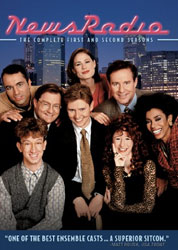
Created by Paul Simms. Directed by Tom Cherones and others.
Written by Paul Simms, Josh Lieb, Joe Furey, Lewis Morton, Brian Kelley, Sam Johnson, Chris Marcil, Drake Sather, Alan J. Higgins and others.
Dave Foley, Stephen Root, Andy Dick, Maura Tierney, Vicki Lewis, Joe Rogan, Phil Hartman, Khandi Alexander, Jon Lovitz.
Seems straightforward, but the wacky cast and creative writing made this an interesting, if unrealistic, portrayal of an all-news radio station. Hartman had previously been on Saturday Night Live. Tierney would start a ten year run on E.R. upon completing this show.
The Truth About Cats and Dogs (1996)
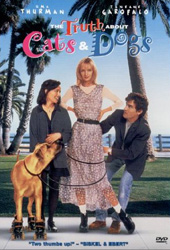
Directed by Michael Lehmann. Written by Audrey Wells
Uma Thurman, Janeane Garofalo, Ben Chaplin Jamie Fox
Garofalo plays a veternarian and radio talk show host. Just exactly how many talk shows are there on the air today (or even back in 1996) about pet animals?
Is it believeable that Ben Chaplin wants Garofalo more than Uma?
That Thing You Do (1996)
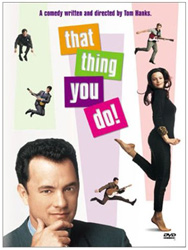
Directed and written by Tom Hanks
Tom Everett Scott, Liv Tyler, Johnathon Schaech, Steve Zahn, Ethan Embry, Tom Hanks,
Charlize Theron, Obba Babatunde, Giovanni Ribisi, Chris Ellis, Alex Rocco, Peter Scolari, Rita Wilson, Chris Isaak, Keven Pollak, Bill Cobbs.
Not really about radio as much as about the rise and fall of an American pop group in 1964 in an alternate universe where the Beatles were an American group (if the early Beatles had only one hit song, ditsy members and if Ringo was the romantic lead and a jazz fanatic).
Ron Howard's brother Clint plays a DJ and director Jonathan Demme plays a director. Alex Rocco, who usually plays mobsters, has a short bit as an obnoxious record label executive who doesn't appear to know or care anything about the music. Little did they know how accurate that portrayal would soon be. Bill Cobbs is superb as a jazz pianist. A fun movie, although I spent most of it watching Liv Tyler (and surprisingly, disliking Charlize Theron's character).
Private Parts (1997)
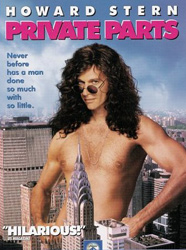
Directed by Betty Thomas. Story by Howard Stern. Screenplay by Len Blum & Michael Kalesniko
As themselves: Howard Stern, Robin Quivers, Fred Norris, Gary Dell'Abate, Jackie Martling, John Stamos, Chris Barron, Flavor Flav, M.C. Hammer, Ted Nugent, Ozzy Osbourne, John Popper, Slash, Renee Suran, Dee Snider and Tiny Tim.
with Mary McCormack, Paul Giamatti, Carol Alt, Allison Janney, Michael Murphy, Jenna Jameson
Howard's story. Got great reviews when it was released because it made Howard look like a really nice guy and family man, although there's also a scene in the film where he's totally out of touch in regards to his wife's feelings and decent human behavior. I think Stern was brave to keep that incident in the film.
There's a great scene where the researchers at WNBC-AM are analyzing their research and ratings reports and discover that people who claim they hate Howard are listening even longer than people who like him because "they want to see what happens next."
Giamatti is great as the station executive who Howard tears to shreds on and off the air. Director Betty Thomas had directed a number of TV shows and The Brady Bunch Movie before this. She had also appeared on Hill Street Blues from 1981 to 1987.
Telling Lies In America (1997)
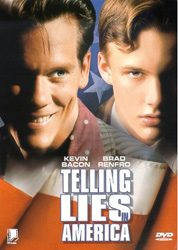
Directed by Guy Ferland. Written by Joe Eszterhas
Kevin Bacon, Brad Renfro, Maximilian Schell, Calista Flockhart,
Paul Dooley, Jonathan Rhys Meyers, Luke Wilson.
A little seen and under-appreciated film about a top-40 DJ (Bacon) who befriends and manipulates a high school student and recent immigrant to facilitiate his payola collections. Back then, being a DJ outside of the biggest cities meant cruddy pay, spare change from doing record hops and personal appearances, and all the records and payola you could steal. (Note: before Congress got involved, payola was not illegal. But not paying taxes on the payola was illegal, which is how they got Allan Freed.)
But the story is also about the representation of "cool" America as top-40 radio and its appeal to outsiders in their zeal to merge into the melting pot and become truly American and whether that culture is one of lies or one of the truth. Great performances from everyone. You root for Bacon's DJ, but also hate him for his faults.
Renfro previously worked with Bacon in the film Sleepers. He died at the young age of 25 from a drug overdose.
Mr. Rock 'n' Roll: The Alan Freed Story (1999)
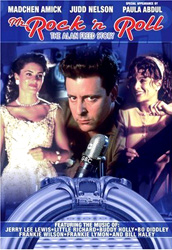
Directed by Andy Wolk. Written by John A. Jackson (book) & Matt Dorff (teleplay)
Judd Nelson, Madchen Amick, David Gianopoulos, Daniel Kash, Paula Abdul with Leon (as Jackie Wilson), James C. Victor (as Jerry Lee Lewis), Walter Franks (as Little Richard), Joe W. Davis (as Buddy Holly), Michael Dunston (as Bo Diddley), LeRoy D. Brazile (as Frankie Lymon), Michael Daingerfield (as Bill Haley) and Fabian and Bobby Rydell as themselves.
A relatively low-budget TV movie. While the musical performers were quite good, Judd Nelson was not convincing as Alan Freed. Based on the book, "Big Beat Heat: Alan Freed and the Early Years of Rock & Roll".
What no film has yet been able to recreate accurately is the atmosphere that Freed created on the radio. Listen to the Freed aircheck on the WINS page for a sample of "rock and roll theatre of the mind".
A Prairie Home Companion (2006)
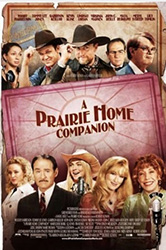
Directed by Robert Altman. Story by Garrison Keillor & Ken LaZebnik. Screenplay by Garrison Keillor .
Woody Harrelson, Tommy Lee Jones, Garrison Keillor, Kevin Kline, Lindsay Lohan, Virginia Madsen, John C. Reilly, Maya Rudolph, Meryl Streep, Lily Tomlin, Robin Williams.
A fictional story about the cancelation of the "A Prairie Home Companion" radio show.
Talk To Me (2007)
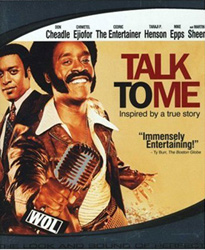
Directed by Kasi Lemmons. Story by Michael Genet. Screenplay by Michael Genet and Rick Famuyiwa.
Don Cheadle, Chiwetel Ejiofor, Bruce McFee, Mike Epps, Peter MacNeill,
Adam Gaudreau, Taraji P. Henson, Martin Sheen
The "true" story of 1960s ex-con and Washington, D.C. air personality Ralph Waldo "Petey" Greene Jr., whose mantra was "tell it like it is" (although this was also Murray the K's and Aaron Neville's mantra) and who spoke to his listeners about race and power in America.
The Brave One (2007)
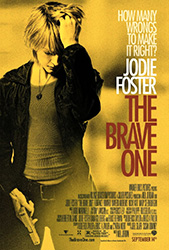
Directed by Neil Jordan. Story by Roderick Taylor & Bruce A. Taylor. Screenplay by Roderick Taylor & Bruce A. Taylor and Cynthia Mort.
Jodie Foster, Terrence Howard, Nicky Katt, Naveen Andrews, Mary Steenburgen.
Jodie Foster plays a radio host who is brutally attacked and seeks revenge in a female version of Death Wish.
Cadillac Records (2008)
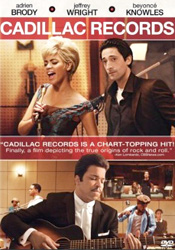
Directed and written by Darnell Martin
Adrien Brody, Jeffrey Wright, Gabrielle Union, Columbus Short, Cedric the Entertainer,
Emmanuelle Chriqui, Eamonn Walker, Mos Def, Beyonce Knowles
Also not really a movie about radio, but rather about the music business, it purports to tell the story of Chess Records and its major mostly blues acts: Muddy Waters, Little Walter, Willie Dixon, Howlin' Wolf, Chuck Berry and Etta James.
The cast is really terrific and the relationships between the characters seem to reflect the historical record of what is known about them. The musical performances are incredible, supposedly mostly performed live and have not been heavily mixed for modern ears. Radio comes into play largely when Eric Bogosian, portraying Alan Freed, accepts payola from Leonard Chess.
A terrific movie, but it does play loose with many specific facts. Here are just a few of the historical issues (warning: Spoilers ahead):
- Leonard Chess originally bought an interest in Aristocrat records in 1947. In 1950 his brother Phil joined. (Phil isn't even mentioned in the film, but actually appears as the young man who introduces Leonard to Etta James, seeming to indicate that Phil was left on the cutting-room floor. This is much like how Neshui Ertegun was never mentioned in "Ray"). When Phil joined the company, they re-incorporated the company as Chess Records. The film makes it seem like Leonard created Chess records from scratch.
- In the film, Muddy goes from a sharecropper shack to the streets of Chicago where he soon meets Chess. But in actuality, he moved to St. Louis in 1940, and then returned to Mississippi to run a juke joint before heading to Chicago in 1943. It was at least four years before he met Leonard Chess although Muddy's early recordings were released on Aristocrat.
- The film shows Muddy heading to London for the first time after Chess was sold (to GRT) in 1969, but he first toured England in 1958, although it wasn't a success because the audience expected acoustic folk music.
- The film never mentions Muddy's great success at the Newport Folk Festival in 1960.
- The film implies that Leonard had only very young children at the time of his death, when in actuality, his 27 year-old son Marshall was running the company in 1969, just before the sale. Leonard was actually off running TV properties at this point.
- Alan Freed (Eric Bogosian) is shown on the air during a time period when he was either serving time after the payola scandals or had disappeared from the scene because no one would hire him.
- The great piano player Otis Spahn is never mentioned (although Hubert Sumlin as played by Albert Jones has a small part.)
- Chess is portrayed as only being a blues label (Chuck Berry aside) with the five great stars. But Chess also had a great Jazz label with such artists as Ahmad Jamal, Ramsey Lewis, Sonny Stitt, Yusef Lateef and others and in the early 50's, it recorded vocal groups such as The Flamingos and The Moonglows, both of which had big hits (although they were covered by white artists, who had bigger hits.) In addition, Bo Diddley was left out of the movie (supposedly because another film is in the works about Diddley's life.)
- Leonard Chess did not die as portrayed in the film, but several months later under less dramatic circumstances.
While the affair between Chess and Etta James actually happened, the appealing actors were a lot more fun to watch than the actual participants would have been. Leonard Chess, even though he was only 52 when he died, actually looked very much like ex-NYC mayor Ed Koch, and Etta James was short and squat. When you look at photos of them, it's hard to imagine romance between them and Chess was more than 20 years senior.
But having said all that, Cadillac Records is still a great movie with great acting and musical performances and well worth seeing. Every major member of the cast is spectacular, but the standout for me was Eamonn Walker as Howlin' Wolf, who simply exudes the danger and power of the man.
Pirate Radio (2009) aka The Boat That Rocked
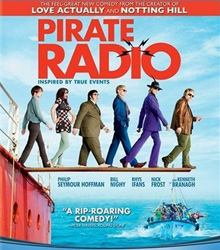
Directed and written by Richard Curtis
Michael Hadley, Charlie Rowe, Lucy Fleming, Philip Seymour Hoffman, Tom Sturridge,
Ian Mercer, Bill Nighy, Will Adamsdale, Tom Brooke, Rhys Darby, Nick Frost,
Katherine Parkinson, Chris O'Dowd, Ike Hamilton, Stephen Moore, Kenneth Branagh
Most Americans don't realize that in the early 1960s, it was almost impossible to hear rock music on the BBC and the BBC was the only game in town in England, unless one elected to listen to shortwave radio to pick up signals from other countries. In fact, rock was so limited on the BBC, that it's a miracle that the Beatles and other groups of that era were able to succeed. As a result, a number of pirate radio stations started broadcasting in international waters, including Radio Caroline, on which the film is very loosely based.
This film mixes a drop of fact and a lot of fantasy to make an extremely entertaining and enjoyable movie. There are some outstanding performances, including those of Philip Seymour Hoffman as the lone American DJ on board, Bill Nighy as the ship's captain and godfather of young Carl, who is sent to live on the boat after some trouble at school, and Kenneth Branagh as a officious government minister who perceives rock and roll as the end of civilization.
One of the more effective parts of the film is when it demonstrates how important radio was to the lives of its listeners.
In reality, Radio Caroline did not face the fate of the ship in the movie, but rather was towed away for non-payment of bills, but once again, confrontation makes for a much better movie drama. But the movie is still a lot of fun, even if most of it never happened. Most of the Radio Caroline DJs eventually worked at commercial radio or the BBC, but some have returned to a new non-profit Radio Caroline, mostly broadcasting on the web, in some cases donating their services.
The King's Speech (2010)
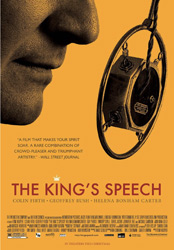
Directed by Tom Hopper. Screenplay by David Seidler
Colin Firth, Geoffrey Rush, Helena Bonham Carter, Derek Jacobi, Michael Gambon, Guy Pearce, Clare Bloom, Timothy Spall
This wonderful film tells the story of King George VI, who ascended the British throne when his brother Edward abdicated in December of 1936 to marry a divorced woman. But just as television played an incredibly important role in the ascension of John F. Kennedy to the presidency in 1960, radio was becoming ever more important a method of communication in the 1930s on the eve of World War II. King George VI, for a variety of reasons, had a stammer and this film tells the story of his relationship with a speech therapist, Lionel Logue, played by Geoffrey Rust, who came to his aid. But it also demonstrates both the complexity and importance of radio communications at a time when a nation was about to plunge into the horror of a long war.
In a World... (2013)
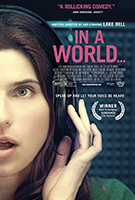
Directed by Lake Bell. Screenplay by Lake Bell
Lake Bell, Rob Corddry, Alexander Holden, Eva Longoria, Ken Marino, Demetri Martin, Fred Melamed, Tig Notaro, Nick Offerman, Michaela Watkins, Geena Davis, Stephanie Allynne.
While radio doesn't play a direct role in this film, voice-over actors do. In a world where so many movies are about robots, aliens, unrealistic super heroes, stupidly violent villains, haunted houses and people who act in ways that one could never imagine any real human being behaving, "In A World..." is an incredibly refreshing adult, intelligent film that reminds one of the kinds of films François Truffaut used to make, if any of his films had a truly happy ending. In fact, one can imagine "In A World..." being the "Day for Night" of the Hollywood voice-over set.
Admittedly, I was pre-disposed to like this film since I worked with (New York) voice-over actors in a previous life.
Lake Bell, who has previously shown up in character parts on shows such as "Boston Legal", has proven herself a triple-threat: this film has a sharply written script, she has directed smart performances and Ms. Bell is a delight to watch and hear as she obviously has the talent to be the character she portrays. While most of the relationship bits are more mundane, they're somewhat more realistic than we're used to in most of today's films.
One of her character's most endearing attributes is the ability to imitate other people's voices, which she collects almost as a sociologist or archeologist would. I wish she had spent a bit more time in the film demonstrating these incredibly funny abilities, most of which already show up in the trailer.
Now having said that, I must also say that when I worked in the industry, the voice-over actors who I worked with (which did include women even back in the 1970s and 80s, although men were definitely the majority) did not display the kind of ego-driven angst that the characters in this film elicit. But the stakes were lower - the people who I worked with were generally working on educational or corporate media and radio spots - not national TV spots for major $100-million-dollar motion pictures. There were some actors who were quite wealthy but would never take a vacation. They were afraid that if any client used a different talent in their absence that they would never get work from that client again. But I never sensed any real competition between them. That's not the case in this movie, but the competitive angst displayed is one of the highlights of the film.
Back to Top
Documentaries About Radio
Here are some great radio documentaries. More to come....
"Playing In the FM Band: The Steve Post Story"
This is a 90 minute documentary about Steve Post, who at WBAI (and later at WNYC) is considered to be one of the fathers of free-form radio.
“Just when you think you’ve scraped the bottom, you find you’ve only scratched the surface,” Post once said, the sardonic radio host whose voice was a familiar one during the turmoil of the 60's, 70's and beyond. He pioneered freeform radio by improvising self-deprecating stories drawn from from his personal life and the politics of the day. Frequent guests included Marhall Efron, Abbie Hoffman, Paul Krassner (publisher of The Realist), John Lithgow and Marilyn Sokol. Director Rosemarie Reed presents a time and a type of radio that has largely been forgotten.
(posted 3/12/22)
"Worst to First: The True Story of Z100 New York"
This is a new 64 minute documentary about Z100 and Scott Shannon that's available on a number of streaming platforms.
As the New York Times review states, "Free-form FM radio was gone, Album Oriented Rock FM radio was on life support and AM radio was embracing talk, so the new Z100 went to a Top 40 format."
The film features interviews with Jon Bon Jovi, Joan Jett, Debbie Gibson, Geraldo Rivera, Nile Rogers, Tony Orlando and Jim Kerr. The Times gave it a mixed review stating that "the movie’s prefab on-screen graphics are just one reason “Worst to First” has such a limp tone overall."
WHTZ was formerly WVNJ. I believe the original August 1983 weekday lineup was Scott Shannon, Dr. Christopher Reed, Cat Simon, Jack the Whack, Sean "Hollywood" Hamilton and Stevie Brooks. The station reverted to mainstream Top-40 by April of 1996.
I do disagree with the notion that AOR radio was on life support. WNEW-FM was still doing quite well in 1983, even if it had become more formatted than it had been before 1981.
(posted 2/11/22)
"Free-Form, Baby! The FM Radio Revoluton: The Men and Women Who Invented Modern Radio"
There's going to be a new documentary about the rise and fall of FM free-form radio, from director Mark Herzig. In the works for several years, Mark expects to complete the documentary by January of 2020 and begin showing the work at film festivals. Hopefully, it will then obtain distribution on a streaming service and/or be available on home video.
From the trailer, this looks to be a fantastic look back at what we consider to be the best years of music radio. We were especially glad to see that it includes non-commercial as well as commercial radio.
For those who didn't live through the era or who didn't listen to free-form FM radio yet, many make the mistake of assuming that the free-form and progressive rock music stations of the day were no different than the classic rock music stations of today, but that's a fallacy. The stations of that era had much bigger playlists (by virtue of the fact that they didn't have playlists) and they played a much greater diversity of music. The programming was largely about playing themes and creating moods. They were also quite political and were frequently heavily involved in the community and in national politics.
The documentary includes or talks about Larry Miller, Bob Fass, Shadoe Stevens, Tom Donahue, Howard Hesseman, Russ Solomon (Tower Records) and musicians such as Al Kooper, Marty Balin, Todd Rundgren, Taj Mahal, Elvin Bishop and Jack Casady to name a few.
Free-Form, Baby! Official Trailer from Mark Herzig on Vimeo.
"Dare To Be Different: WLIR-The Voice of Generation": A movie about WLIR

There's a documentary about WLIR radio, back when it was rock station that played lots of music that no one else played. Among the WLIR staff interviewed in the film are Delphine Blue, Bob Marrone, Donna Donna, Denis McNamara and owner Elton Spitzer. It also includes interviews with Sam Ash, Gary Del'Abate, Ron Delsner (concert promoter), Steve Leeds (VP Sirius), Monte Melnick (Tour Manager for the Ramones), Matt Pinfield, Seymour Stein (Founder, Sire Records), Debby Harry, Thomas Dolby, Billy Idol, Joan Jett and many more.
There's a trailer on the website, Looks like this is going to be great. The film premiered at the Tribeca Film Festival in April of 2017.
UPDATE: The film will premiere on Showtime on March 30, 2018 and be available on Showtime's VOD services the next day.
"I Am What I Play" now available on Vimeo
We first wrote about "I Am What I Play", a documentary that profiles four DJs in major markets who were active during the 1960s to 1980s, in August of 2015. It features Meg Griffin as well as Toronto-based David Marsden; WBCN, Boston morning man Chalres Laquidara; and Seattle DJ and PD Pat O'Day.
The film includes rarely seen archival footage of the DJs, the radio stations and the performers. The documentary is now available for rent or purchase on Vimeo for just $5 (rent) or $15 (purchase): Rent or Buy "I Am What I Play". (Posted 5/1/17)
Sex & Broadcasting: A Film About WFMU

WFMU is the independent free-form, truly listener sponsored (they don't accept corporate underwriting) radio station broadcasting at 91.1FM in New York and 90.1FM in the Hudson Valley. It was once part of the now-defunct Upsala College, but later split off to maintain its independence. It's also the place where Vin Scelsa got his start.
There's a new documentary about the station called "Sex & Broadcasting: A Film About WFMU". It was positively reviewed today (March 30, 2016) in the New York Times.
You can also click the image above to navigate to the film's website.
Radio Unnameable news
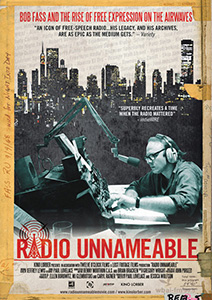
Radio Unnameable, the documentary about WBAI's Bob Fass, is now available on a DVD which includes several hours of extra material including deleted scenes, rare audio recordings from Bob Fass' library, some archival video and a short film called "Night People". It can be purchased from Amazon.
More information on the film is available on our media page.
Airplay: The Rise and Fall of Rock Radio (2008)
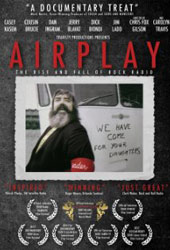
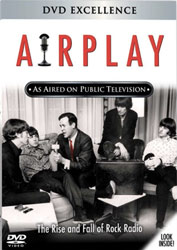
Directed by Chris Fox Gilson and Carolyn Travis
Casey Kasem, Cousin Brucie, Dan Ingram, Jerry Blavat, Dick Biondi, Jim Ladd, David Crosby, Raechel Donahue, Jocko Henderson, Graham Nash, Grace Slick, Martha Jean Steinberg, Leley Gore, Art Laboe, Scott Shannon, Rufus Thomas, Ben Fong Torres, Bob Weir, Jann Wenner, Pete Fornatale, Tom Donahue, Murray the K, Alan Freed, Meg Griffin, Dick Clark, Wolfman Jack
A terrific documentary about rock radio and the personalities who created it, including its beginnings in the 1950s, the advent of top-40 radio, the emergence of FM and freeform radio and the era of consolidation and the future, including the impact of satellite radio.
Radio Wars (2012)
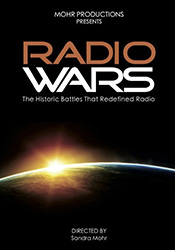
Directed by Sandra Mohr. Written by Mark Mallas, Sandra Mohr and Andy Montero
But Burrell, Tommy Calvert, Jr., Dominique Garcia, Richard Keane, Andy Montero, Spencer Osborne, Rick Phebus, Rob Potylo, Martine Rothblatt and Art Vuolo Jr.
We haven't seen this one, but IMDB describes it as “…a daring and unconventional look at the history of radio. From the pitched battles surrounding its invention to the secret fights for dominance between old and new media, radio has always been at war”.
Radio Unnameable (2012)

Directed by Paul Lovelace and Jessica Wolfson
Bob Fass, David Amram, Judy Collins, Robert Downey Sr., Marshall Efron, Arlo Guthrie, Larry Josephson, Paul Krassner, Judith Malina, Steve Post, Jerry Jeff Walker
Unless you're Ken Burns, it's almost impossible today for serious independent filmmakers to get documentaries completed because it's so hard to obtain funding. There are a number of documentary projects of interest to us that have been underway for years, with no signs of completion. Unfortunately in the United States, most have to be abandoned.
Directed by Paul Lovelace and Jessica Wolfson, RADIO UNNAMEABLE is a documentary film about legendary radio personality Bob Fass, who revolutionized the FM dial on listener supported New York station WBAI by serving as a cultural hub for music, politics and audience participation for nearly 50 years. Long before today's innovations in social media, Fass utilized the airwaves for mobilization, encouraging luminaries as well as ordinary listeners to talk openly and without commercial considerations, taking the program in surprising directions. RADIO UNNAMEABLE is a visual and aural collage that pulls from Bob Fass's immense archive of audio, film, photographs and video that has been sitting dormant until now.
When Paul and Jessica contacted us over a year ago to see if we had any WBAI material, I had my doubts about the success of such an effort. After all, there aren't that many people interested in radio these days. Take those people and filter them down to those that care about New York radio. Then take those people and find the ones who still care about 1960s-70s radio. (Well...OK, those are the people who visit this site.) Now take those remaining and find the ones who care about Bob Fass and WBAI. I thought that number would be about nine (me being two of them).
Then I thought that even if there was such interest, how much archival material, especially visual material, could possibly be available? After all, the peak of Fass' radio career took place in the 1960s and 70s, before the age of portable video.
I couldn't have been more wrong. This film has been selling out at the Film Forum. It is filled with wonderful visuals and audio. As it turns out, Fass saved about 7000 reels of tape from his shows. (Not the least bit organized or cataloged, but at least they were kept).
This film is about far more than one late-night radio personality. It's about a city, political and social movements, the best use of radio to get something positive accomplished, and how Fass (and a few others like him) created a comfortable environment for new artists to explore their art and present it to the public before the age of complete and crass commercialism. But it's also about how internal politics and the segmentation of political movements came together to destroy even the most utopian environments and the resulting fallout.
While no commercial radio station was ever as free-form as Fass (and Steve Post) was on WBAI, it's easy to see the influence he had, especially on personalities like Vin Scelsa, who appears in the film. Also appearing is Judy Collins, the voice of Joni Mitchell, Paul Krassner, Steve Post, Abbie Hoffman, Marshall Efron, Dave Van Ronk and many other luminaries of the era.
We always knew there was a core of people who listened to WBAI, but I don't think many outsiders today believe it had all that much influence. The reality, as shown in the documentary, is that Fass could get thousands of people to show up for a "Fly-In" at Kennedy Airport or the equivalent of a flash-mob at Grand Central Station (which ended in violence) and many other such events.
One of the surprises of this documentary is that it's so damned entertaining - it's simply a delight to watch. It brings us back to a time of great social movements as well as silliness and excesses. But you walk away from this film thinking, "Radio was really important then, wasn't it?" And it mostly seems so trivial and unimportant now.
Listeners to his show were constantly trying to seek ways to help people. One woman called-in distraught because of an apartment fire. People called in offering her a free hotel room. Fass got listeners (or his "cabal", as he called it) together to clean the streets during a garbage strike. Fass himself kept a guy on the air who claimed to be in the process of committing suicide and saved his life. Can you imagine any radio station, commercial or non-commercial, that could accomplish these things today?
You can find more information on the film here: More info and links
La Maison de la Radio (2013)
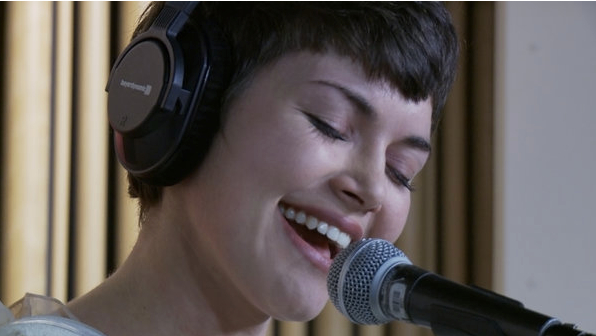
Directed and edited by Nicolas Philbert.
Jean-François Achilli, Evelyne Adam, Jean-Claude Ameisen, Arno, Alain Arnstamm, Pierre Bastien, Thomas Baumgarter, Sophie Becherel, Alexandre Besikian, Céline Bonhomme, Angélique Boulin, Alain Bédouet
A day in the life of Radio France.
I Am What I Play (2015)

Produced and directed by Roger King
Meg Griffin, David Marsden, Charles Laquidara, Pat O'Day
From the mid-1960s to the 1980s, the rock radio DJ played an unprecedented creative role in the rock music world. This documentary profiles four air personalities in major markets during this period: their programming, their politics and their deep connections with music and fans in the heyday of rock radio. Where are they now -- and how did they reinvent themselves as the medium and market changed?
Back to Top
Radio Books
American Radio History Website
This site has hundreds of magazines and books about radio. This link will take you to the books page, where among other things, you can find biographies of Dan Ingram and Hal Jackson and other radio memories written by such people as Steve Post (WBAI).
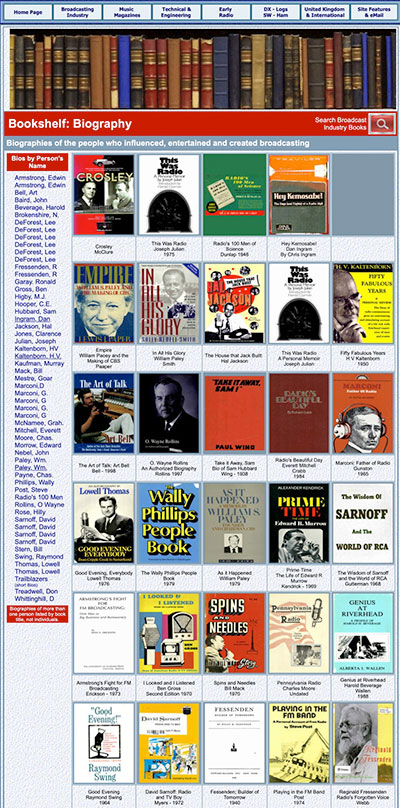
American Radio History Biography Page
Images of America: New York City Radio

by Alec Cumming & Peter Kanze
Our friends Alec Cumming and Peter Kanze have put together a book for Arcadia Publishing that's filled with photographs about New York radio.
The book includes commentary and photos of such classic air personalities as Alison Steele and Dan Ingram as well as radio's pioneers, including inventors Edwin Armstrong and Lee DeForest. The book is a comprehensive, yet concise tour of New York City radio beginning at the turn of the last century and extending through the internet radio of today, stopping along the way at radio's pre-TV golden age and the growth of both top-40 and progresive rock & roll beginning in the late 1950s. The book contains many classic as well as rare photos. My favorites include a display of radios at Bamberger's Department Store from the 1920s, FM inventor Edwin H. Armstrong standing acrobatically on top of an antenna, some rare photos of Alan Freed along with such DJs as Jocko Henderson, Dr. Jive (Tommy Smalls), Bruce Morrow, and Bob Lewis before moving on to the progressive rock era of Rosko, Scott Muni, Murray the K, Alison Steele, Jim Kerr and many others. This is a must have for anyone who ever cared about New York radio.
More info and ordering here.
(Just a link - we don't get anything for this)Up All Night: My Life and Times in Rock Radio

by Carol Miller
As the book jacket says, "The all-American chronicle of radio legend Carol Miller, from her rise to success in a male-dominated world to the rock stars she's known along the way to, for the first time, the private story of her quietly waged battle with a deadly illness."
Carol's been on the air since 1971 and has been a New York air personality since 1973. To look at her and listen to her though, you'd think she couldn't have possibly been on the air for even half that time.
Click here
for the book on AmazonClick here
for a NY Times article.1950's Radio in Color: The Lost Photographs of Deejay Tommy Edwards
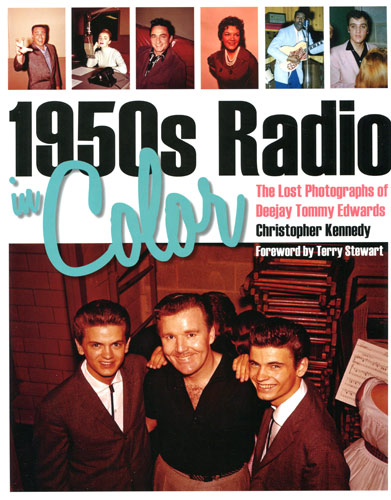
by Christopher Kennedy
(The Kent State University Press - ISBN: 978-1-60635-072-0)
Christopher Kennedy is an accomplished musician and songwriter who has released five albums with the band Ruth Ruth. For years, he's been looking for a copy of the long-lost rock ‘n’ roll film The Pied Piper of Cleveland, which purports to contain the earliest known footage of Elvis Presley. He still hasn't found that film, but in the process of looking for it, he came across a treasure trove of photographs taken by Cleveland DJ Tommy Edwards, mostly at WERE-AM and some concerts between 1955 and 1960. In addition, author Kennedy separately found copies of Edwards' own “T.E. Newsletter”, a remarkably comprehensive review of the music industry in Cleveland as well as Edwards' personal weekly survey of important pop and country records.
The photographs in this book are remarkable because they show artists from all genres of music (and film) at their very raw, unvarnished and un-manipulated beginnings. And many of the Ektachrome photographs, in spite of some color deterioration, are amazingly beautiful in spite of the fact that they were photographed with a mere Kodak Brownie camera. Against a bright red stage, we see the deep blue pants of a 29-year-old Chuck Berry, playing then as now, with a pickup band. We have some great shots of Elvis from 1955. And we have Gene Vincent, a pimply Roy Orbison as well as Dion and Sam Cooke. But there's also pop stars like Billy Eckstine, Jerry Vale, Andy Williams, Patti Page and Johnny Mathis; movie stars like Charlton Heston and Henry Fonda; and country stars like Johnny Cash. But my favorite photo in the book is a photo of soul singer Malcom Dodds, sitting at an old heavy-duty broadcast turntable.
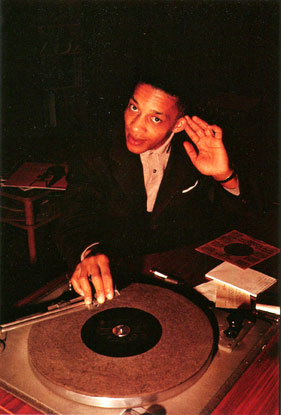
The book contains several essays and each artist's photo is accompanied by a short article by the author, with many containing quotes about the artist from the “T.E. Newsletter” as well as contemporary comments from those involved. There's a lot of research contained in this volume.
What's important about this book is how it demonstrates that radio and the radio DJ were once the core of the country's culture. The DJ was completely immersed in the music and the artists that they played. Artists sought out the publicity that only radio could provide. In the case of Tommy Edwards, his newsletter was as insightful as those published by any radio consultant in later decades. I think it's all too easy to forget just how important and powerful radio was and how much radio was responsible for the birth and development of rock ‘n’ roll. And yet, at least in Cleveland, rock ‘n’ roll lived comfortably along with country music, just as Ray Charles would later prove that soul and country could be one thing as well. I dare say that if a new genre of music evolved today, it would not survive because none of the media that exists today could act as its guardian the way that radio guided rock. Buy this book. It's one of the last memories of what made 1950's American radio great.
Back to Top
Radio Themes
Many radio shows had their own themes. Some were specially composed for the show and some were based upon popular songs of the day. As we find them, we'll post them here.
Make Believe Ballroom
Glenn Miller
Martin Block, a stalwart at WNEW-AM for many years, created the "Make Believe Ballroom" in New York City, which began broadcasting on February 3, 1935 and which was based on a concept developed by West Coast DJ Al Jaris. Block hosted the show until 1954, when he left for ABC. It was taken over by William B. Williams and later by Steve Allen. Block got bandleader Glenn Miller to write the theme for the show.
It's Make-Believe Ballroom Time
Put all your cares away
All the bands are here to bring a cheer your way
It's Make-Believe Ballroom Time
And free to everyone
It's no time to fret
Your dial is set for fun
Just close your eyes and visualize in your solitude
Your favorite bands are on the stands
And Mr. Miller puts you in the mood
It's Make-Believe Ballroom Time
The hour of sweet romance
Here's your make-believe ballroom
Come on, children, let's dance, let's dance!
Jumpin' With Symphony Sid
Lester Young & King Pleasure
Symphony Sid (Sid Torin nee Sidney Tornopol) started in radio in 1937 at station WBNX in The Bronx and was one of the first DJs to play black jazz artists. By 1941, he was working at WHOM in New Jersey. He later worked at WWRL and WMCA. In 1949, he joined the ABC Radio Network.
Because of his influence, a number of songs were written about him, including "Symphony in Sid" by Illinois Jacquet and "Jumpin with Symphony Sid" detailed here.
After an arrest for using marijuana, he moved to Boston for a time, but returned to New York City in 1957 to host a latin music show on WEVD.
This song has been recorded several times, most recently by Joe Jackson on the "Jumpin' Jive" album, released in 1981.
Jumpin' with my boy Sid in the city
Jumpin' with my boy Sid in the city
Mr. President of that DJ committee
We're gonna be up all night gettin' ready
We want you to spin the sounds from the city
Far down in the land that's real, real pretty
Let everything go real crazy over J-Z
Make everything go real crazy over J-Z
Let everything cool for me and my baby
I don't wanna think we're listenin' to Lacy
It's gotta be Pressburg, Shearing or the Basie
The dial is all set, real close to 80
Let it roll
Let it roll
Let it roll
Back to Top
